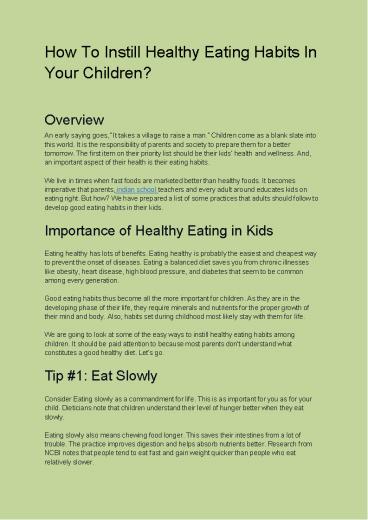
Teenagers have a lot to do. Teenagers place more emphasis on dating and socializing, than on basic self-care such as nutrition and exercise. These are crucial to their mental and physical well-being. These healthy living tips will help teens reach their goals. Make sure your teenager gets enough sleep and has time to socialize with their friends. Healthy living tips for teens will make them feel better about themselves and help prevent them from falling into unhealthy habits.
Limit screen time not to exceed two hours per hour
Parents are often encouraged to limit the time that their teenagers spend in front of screens. You should consider many factors when making such an important decision. It is important to take into account age and activity levels, as well as whether screen time is limiting children's academic and social development. In 2016, the American Academy of Pediatrics updated its guidelines regarding screen time. They recommend that children and adolescents watch no more than two hours of TV or other forms of screen time per day.
Maintain a strong social network
The importance of keeping a close eye on your teen's social networks should be part of your daily parenting routine. You should monitor your teen’s social media activity and be the first person they add as friends. This will help you build a relationship and inform your teen about potential dangers. Teenagers shouldn’t share personal information on social networking sites, especially if they are sharing their personal information.

Get enough rest
Teens often feel like they don't get enough sleep. Teenagers need more sleep as their bodies grow rapidly. They also need to unwind. The following tips will help your teenager sleep a full eight hours each night. To avoid any dramatic shifts in the schedule, teenagers should be able to get up at the same time each morning. However, if you are unable to get your teenager to wake up on time, you may want to give them some time on the weekend.
Enjoy fresh food
Teenagers need to eat at most 3 meals per day. Avoid diet foods that require cutting out entire food groups. Fad diets may not provide adequate nutrition. Your teen could be lacking in vitamins or minerals. Be a role model for your teen to live a healthy lifestyle. Get plenty of vegetables and fruits, and reduce sugary drinks. Avoid late-night snacking and make fresh vegetables and fruits your mainstay of snacks after school.
Hydration is key
A healthy lifestyle is key to your child's overall health. A healthy lifestyle that includes drinking plenty of water will not only benefit their health but also keep them alert and awake. Drinking cool drinks like water or sports drinks is refreshing, especially when it's hot. You can keep them hydrated with water readily available and frequent breaks.

FAQ
What are some examples of mental-emotional problems?
Mental disorders include any condition that causes significant distress or impairment in functioning. Depression, anxiety, schizophrenia and borderline personality disorder are some examples of mental disorders.
How can I prevent mental health issues?
Preventing mental disorders is easy. But, here are some tips to keep in mind:
-
Don't drink alcohol. You can have a negative effect on your mood and increase your chance of getting depressed.
-
Avoid drugs. Avoid using drugs.
-
Get enough sleep. Sleep deprivation can make you feel anxious and depressed.
-
Exercise regularly. Exercise can release endorphins, which make you happy.
-
Healthy foods are the best. Do not eat junk food. You will feel lethargic and depressed.
-
Spend quality time with those you love. It can be a great way to improve your mood.
-
Have fun. Have fun!
-
Retire from social media. Social media sites can make you feel lonely and isolated.
-
Take care of yourself. Treat yourself nicely, even if you aren't feeling great.
-
Ask for help. Ask for help if you are having difficulty coping. Talking to a friend or family member can help.
-
Remember to be kind and gentle with yourself. It helps to release stress and tension. It does not mean that anything is wrong.
-
Keep busy. Do something you enjoy.
-
Maintain good hygiene. A lack of hygiene can make you look unattractive and unclean.
-
Keep connected. Staying connected will help you stay positive.
-
Learn how to relax. Relaxation techniques such as meditation and yoga can help you to cope with stress.
-
Find meaning in your work. You can find fulfillment in your hobbies and work by finding meaning.
-
You should be focusing on the moment. Concentrate on the present moment and you won't be so worried about the distant future.
-
Set goals. You can set goals to motivate yourself to reach them.
-
Do something for yourself. Your self-esteem can be raised by doing something kind for yourself.
-
Practice gratitude. Gratitude will help you appreciate all the positive things in your life.
-
Volunteer. Volunteering can provide a rewarding way to spend time with friends and make an impact on the world.
-
Give back. Giving back can help you feel fulfilled.
-
Watch out for warning signs. If you notice any changes in behavior, don't hesitate contacting help.
What should I do when I'm experiencing mental health problems?
It's imperative to seek help when you're struggling with any mental health issue. You might have experienced some sort of trauma or abuse in the past. You might have experienced trauma or abuse in the past.
A mental illness such as an eating disorder or addiction could also be present. These disorders can have a devastating effect on your life.
They shouldn't be dealt with on their own. You should speak to someone who understands what you're going through. A professional therapist will be able to provide you with the support and guidance that you need in order to overcome these problems.
Why is students' mental health important?
Students' mental health is crucial because it allows them to be focused on school and excel academically. If you don’t feel happy, you won’t do well in school. Students who suffer from depression often miss class, which leads to poor grades. This may lead to dropping out of high school and eventually college.
Talk to your family and teachers if depression is a problem. They will help you get the treatment you need.
It is important to understand that not everyone with depression needs medication. Talk therapy is effective for many people. Talk therapy is effective for many people.
How does mental health affect my relationships?
Your mental health can have a profound impact on your daily life. It can impact your ability to function well at home, school and work. It can be difficult to build meaningful relationships due to mental health issues.
When you're dealing with a mental health condition, it's easy to isolate yourself from others. You may even avoid social situations because you feel like no one understands you.
It's important to remember, however, that people want to be with you. They just need the ability to approach you.
Talking to others about your feelings can help you connect with them. Ask them to help you.
Here are five ways to improve your emotional and mental health.
-
Exercise - This improves brain function, and boosts energy levels.
-
Sleep - It is important to get enough rest in order to reduce stress and anxiety.
-
Nutrition - Eat healthy foods such fruits and veggies to keep your body strong, energized and happy.
-
Meditation – Regular meditation can reduce stress and anxiety.
-
Socialization - Spending quality time with family and friends keeps us happy.
Statistics
- It means no drinking any alcoholic beverages and no taking any drugs that aren't 100% natural.
- Appropriate nutrition and exercise are likely among the most efficacious and cost-effective positive mental health interventions. (ncbi.nlm.nih.gov)
- It does have some influence, but not nearly as much as we might think, so focusing less on attaining wealth will likely make you happier (Aknin, Norton, & Dunn, 2009); (positivepsychology.com)
- Similarly, for positive mental health, there is likely to be substantial agreement about some typical components (e.g., resilience to stress) 6, and controversy about more atypical components (e.g., career consolidation). (ncbi.nlm.nih.gov)
- More than 50% will be diagnosed with a mental illness or disorder at some point in their lifetime.3 (cdc.gov)
External Links
How To
How to improve your memory
Everyone wants to be better at remembering things. But unfortunately, memory loss is something that happens to us all at some point in time. In fact, more than half of Americans over 65 suffer from some form of dementia.
It doesn't matter whether you're dealing with Alzheimer's, dementia, or other forms of cognitive decline; you have a lot of options when it comes to improving your memory. Here are three easy steps that you can start today:
-
Eat More Fruits & Vegetables. Vegetables contain phytochemicals, vitamins, nutrients, fiber, antioxidants, and minerals that enhance brain function. They also provide essential nutrients that protect against neurological diseases.
-
Get Enough Sleep. Low sleep quality has been linked both to memory loss, poor concentration, and memory loss. You should get seven to eight hours sleep each night.
-
Take a walk. Walking stimulates blood flow to the brain, which improves memory. Walking is good for your health and helps you look slimmer.